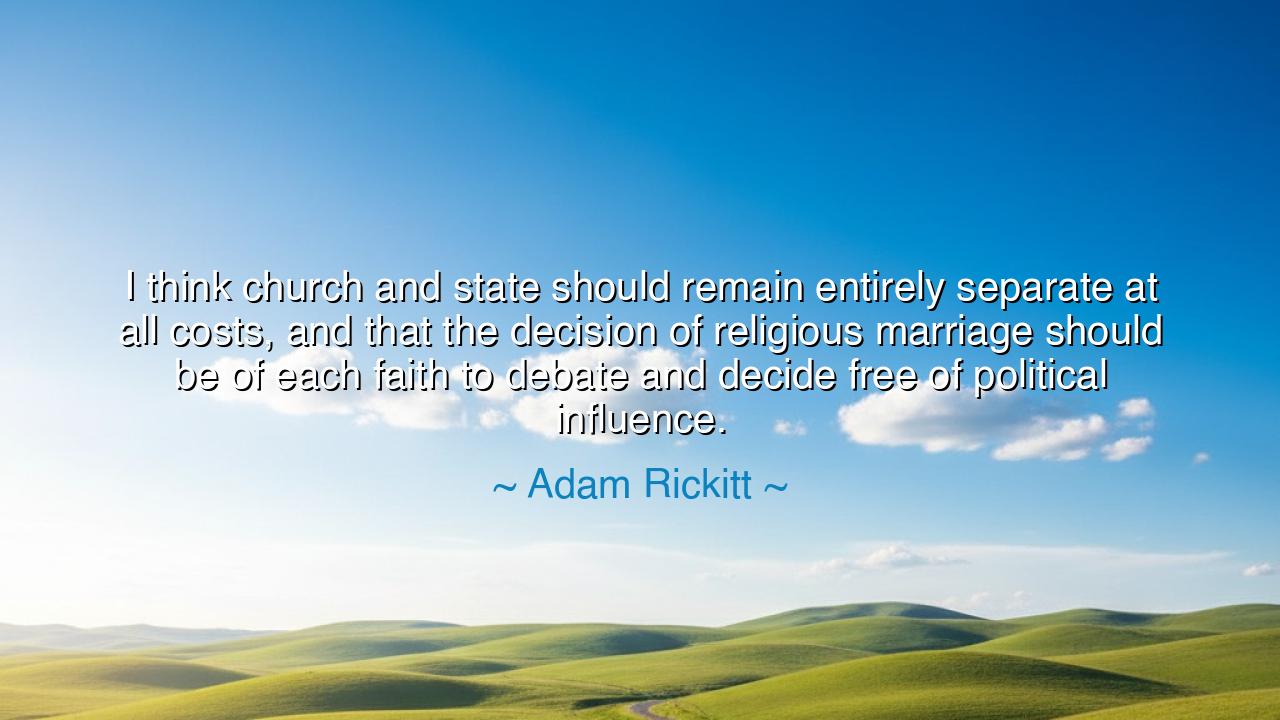
I think church and state should remain entirely separate at all
I think church and state should remain entirely separate at all costs, and that the decision of religious marriage should be of each faith to debate and decide free of political influence.






“I think church and state should remain entirely separate at all costs, and that the decision of religious marriage should be of each faith to debate and decide free of political influence.” — So declared Adam Rickitt, voicing a truth that has echoed across centuries of struggle and reflection: that faith and governance, though both pillars of human civilization, must never become the same pillar. His words are both caution and wisdom, born of long histories where zeal and power became intertwined, and where the spirit of devotion was ensnared by the chains of politics. In this statement lies not rebellion against religion, but reverence for both the sacred and the civic — that each may thrive in their rightful realm, uncorrupted by the other’s ambition.
The ancients taught that harmony arises only when the elements of a great system remain balanced. So too with church and state — two forces born to serve humanity in different ways. The state governs the body of society: its laws, its rights, its justice. The church — or faith, in its many names — governs the soul: its morals, its meaning, its hope. When these two are joined in power, one begins to dominate the other. Religion, when used by rulers, becomes a tool for control rather than enlightenment. Politics, when clothed in sacred language, ceases to be reasoned governance and becomes dogma. Rickitt’s warning that they remain “entirely separate at all costs” is thus not merely political advice — it is a cry to preserve the purity of both belief and freedom.
History itself bears witness to the dangers of their union. Think of Europe in the Middle Ages, when kings claimed divine right to rule, and the sword of government was wielded in the name of faith. The Holy Inquisition burned in the name of piety, and countless souls were silenced for thinking differently. It took centuries of fire and blood before humanity learned that faith forced by law is no faith at all. Out of that long night of persecution arose the dawn of secular governance, when wise minds — like Thomas Jefferson, who penned the idea of a “wall of separation between church and state” — understood that true belief cannot be legislated, and true freedom cannot exist where the conscience is enslaved.
And yet, Rickitt’s words go further. He speaks of religious marriage, that ancient and sacred covenant which belongs to the heart of every faith. To him, the decision of marriage within religion is not for governments to dictate, but for faith communities themselves to discern — guided by their own doctrines, their own sacred texts, their own sense of divine will. For when the state commands what a church must bless, or forbids what a conscience must sanctify, both faith and liberty are wounded. Let each religion, he implies, wrestle with its own understanding of union, love, and sacrament, as it has since the dawn of civilization — free of political influence, uncoerced, uncorrupted.
Consider the example of Roger Williams, the founder of Rhode Island in the seventeenth century. He fled persecution in Puritan Massachusetts, where church and government were one, and founded a colony built upon the radical principle of religious freedom. “Forced worship,” he wrote, “stinks in the nostrils of God.” His vision — that each person must answer to their conscience, not the magistrate — became the foundation upon which modern liberty of faith was built. Williams’ struggle mirrors the spirit of Rickitt’s words: the defense of sacred autonomy against worldly interference.
Thus, we see that the separation of church and state is not a denial of religion’s place in society, but a protection of its sanctity. When faith is free, it flourishes; when it is politicized, it withers into hypocrisy. Likewise, when government governs with reason rather than doctrine, it can protect all citizens equally — believer and unbeliever, temple-goer and skeptic alike. This balance is the hallmark of a just civilization, where neither altar nor throne dominates the other, and the heart is left to seek its own understanding of the divine.
And so, dear listener, take this teaching as both warning and guide: guard the boundary between faith and power, for it is a line drawn not in opposition, but in wisdom. Do not let politics defile the sacred, nor religion cloud the justice of the state. If you are faithful, keep your worship pure and voluntary. If you are a citizen, defend the right of all to believe — or not to believe — without fear. True peace lies not in the rule of one truth over another, but in the freedom for each soul to walk its own path toward truth.
For as Adam Rickitt reminds us, the cost of blurring the sacred and the civic is far greater than any gain it might promise. Freedom of the soul and freedom of the state are twin fires — each brightening the other only when kept distinct. Let them burn side by side, not as rivals, but as guardians of the same light: the eternal light of conscience and liberty.






AAdministratorAdministrator
Welcome, honored guests. Please leave a comment, we will respond soon